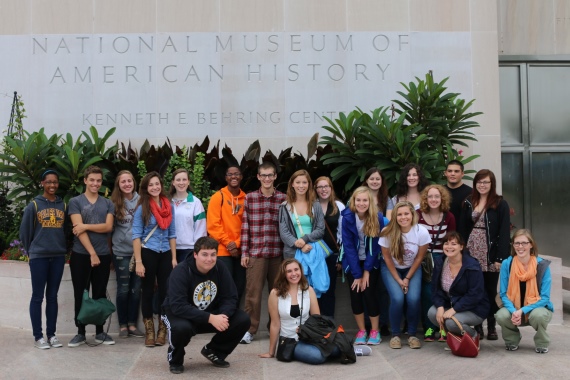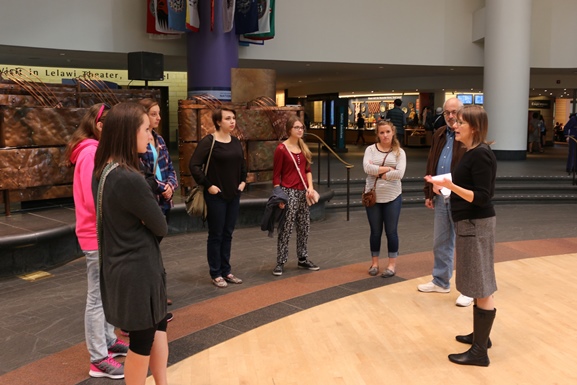SU Begins Planning for an Honors College
 SALISBURY, MD—Finith Jernigan ’07, a graduate of James M. Bennett High School in Salisbury, is a postdoctoral research fellow at Harvard Medical School. Like many Salisbury University students who grew up around the bay and ocean, he loved the outdoors. A runner and president of the campus Cycling Club, he liked to fish and hunt.
SALISBURY, MD—Finith Jernigan ’07, a graduate of James M. Bennett High School in Salisbury, is a postdoctoral research fellow at Harvard Medical School. Like many Salisbury University students who grew up around the bay and ocean, he loved the outdoors. A runner and president of the campus Cycling Club, he liked to fish and hunt.
He also was an Honors student. “The (Bellavance) Honors Program played a large role in my continuing on to the Ph.D. program in chemistry at the University of North Carolina (Chapel Hill),” he said. “Two of my top five favorite classes at Salisbury were a part of the program. … I think the most important part of college is learning how to think, regardless of your major. That is what I enjoyed about the Honors Program the most: Every class I had seemed to be designed not to teach me additional facts, but to improve my thinking. This helped me in my graduate career tremendously and made grad school seem less intimidating.”
This Honors experience, which has led to the success of Jernigan and other SU alumni, is something the University wants to provide to more students. Last week, the University System of Maryland gave its imprimatur to that vision, approving planning for an Honors College.
Dr. James Buss, program director, wants to see honors course offerings expand through the new structure, particularly in areas such as business, education, nursing, biology and more.
Started 35 years ago by English professor Tony Whall, the first Honors cohort met in a windowless exercise room in the old Tawes Gym, located where Fulton Hall now stands. Many students were philosophy majors; the focus was on the liberal arts. Today, Honors students congregate and learn in the Thomas E. Bellavance Honors Center, a refurbished home at the corner of Camden Avenue and Loblolly Lane, named for SU’s sixth president. Several classes are held in Manokin Residence Hall, which houses four freshman Honors Living Learning Communities, as well as Sea Gull Square, home to one for sophomores. In the last two years, the number of Honors students has nearly doubled, with its largest freshman class entering this fall. Some 350 total students currently are enrolled, and Buss hopes to see it grow to 400 next year. SU has an undergraduate population of some 7,100 full-time students.
“We want to expand the Honors experience,” Buss said, “with classes tailored to the needs of each of SU’s four academic schools.”
This is already the direction administrators have been pursuing. To be considered for admission, for example, the Honors Program suggests incoming freshman have a high school GPA of at least 3.5. For most, that isn’t an insurmountable hurdle. The average high school GPA of entering freshmen at SU is 3.69. Historically, the program has appealed to liberal arts majors, but today’s Honors students hail from across campus, with the majority coming from the Richard A. Henson School of Science and Technology. Buss hopes that an Honors College will better serve all students and draw faculty from across campus to teach. He encourages University staff and faculty to submit course ideas, particularly ones that transcend traditional academic boundaries.
 Such experiences offer what Buss thinks is the greatest benefit to both faculty and students: the Honors College as an incubator for teaching innovation. “Historically Living Learning Communities came out of the Honors experience; undergraduate research came out of Honors,” he said. Course titles are a cornucopia of creative juxtapositions: Statistics through Baseball; Music and Power; Violence in Video Game Design, Theory and Culture; and Geography of Sport, to name some. Classroom study is supplemented by engaging guest speakers, such as the cartoon editor of The New Yorker; study trips to destinations off the beaten path such as Iceland; and unique volunteer experiences including a horse rescue center.
Such experiences offer what Buss thinks is the greatest benefit to both faculty and students: the Honors College as an incubator for teaching innovation. “Historically Living Learning Communities came out of the Honors experience; undergraduate research came out of Honors,” he said. Course titles are a cornucopia of creative juxtapositions: Statistics through Baseball; Music and Power; Violence in Video Game Design, Theory and Culture; and Geography of Sport, to name some. Classroom study is supplemented by engaging guest speakers, such as the cartoon editor of The New Yorker; study trips to destinations off the beaten path such as Iceland; and unique volunteer experiences including a horse rescue center.
The Honors College model is already in place at other University System of Maryland campuses including the University of Maryland, College Park; University of Maryland, Baltimore County; and Towson University. As SU’s new Honors College evolves, Buss expects its students will take some 20-25 percent of courses through its enhanced curriculum, which aligns with national norms in Honors education.
The commitment to Honors education benefits students. It already has produced SU’s first Gates Cambridge and Fulbright teaching scholars, and many of its alumni have gone on to graduate, medical, law and other professional programs.
For alumnus Len Foxwell ’92, chief of staff for Maryland’s Comptroller, his Honors studies were “not only a challenging experience, but a humbling one.” Foxwell was a political science major with strong beliefs. Pushed to be a better thinker, then director Whall challenged the Eastern Shore native to write papers arguing from political perspectives different than his own. The skills that developed and that helped him to become a successful civil servant largely were refined in the Honors Program, he said.
For more information on SU’s Honors Program and the new Honors College, call 410-677-6556 or visit www.salisbury.edu/honors.
